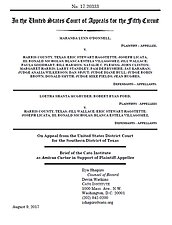Learn more about Cato’s Amicus Briefs Program.
Maranda O’Donnell was arrested for driving with a suspended license and bail was set at the prescheduled amount of $2,500, which she could not pay. Ms. O’Donnell was not alone in having bail set at an amount that could not be paid. Robert Ford’s bail was set at $5,000 for misdemeanor theft of property and Loetha McGruder’s bail was set at $5,000 for the misdemeanor of giving a false name to a police officer. There are many other such examples; all of these bail amounts were set according to a predetermined schedule based on the offense; none of the defendants could afford the bail and so were forced to stay in jail. According to one report, 81% of misdemeanor arrestees in Harris County (Houston), Texas, were unable to post bail at booking, and 40% were never able to post bail. Ms. O’Donnell sued Harris County and various government officials on behalf of herself and all others similarly situated for violating the Fourteenth Amendment’s Due Process and Equal Protection Clauses by setting bail amounts higher than defendants could pay, which detained indigent people much longer than those financially able to pay. The district court found that the predetermined bail schedule was treated as a “nearly irrebuttable presumption in favor of applying secured money bail at the prescheduled amount.” Further, the court found that Harris County did not even provide “timely hearings” to prove their inability to pay or even the reasons why defendants were being denied a bail they could paid. The court issued a preliminary injunction ordering the county to release misdemeanor defendants on personal bond—not secured by cash in advance—within 24 hours of being arrested. The county appealed to the U.S. Court of Appeals for the Fifth Circuit, where Cato has now filed a brief supporting the injunction based on the history of bail. Bail has ancient roots going back to before Magna Carta. Even before the United States existed, English courts required that bail be set on an individualized basis based on the financial ability of the defendant. When the king’s sheriffs issued bail that was too high to be paid, the prohibition on excessive bail was created in the English Bill of Rights, which was then incorporated into the U.S. Constitution in the Eighth Amendment. As both the Supreme Court and D.C. Circuit held in 1835, “to require larger bail than the prisoner could give would be to require excessive bail, and to deny bail” in violation of the Constitution. This was the understanding in America for more than 100 years after the Founding. The modern Supreme Court has continued to recognize the protection that these ancient requirements for bail provide: “In our society, liberty is the norm, and detention prior to trial or without trial is the carefully limited exception.” United States v. Salerno (1987). These long-standing bail customs require an individualized determination of the bail amount, which was not provided by Harris County, violating the defendants’ right to the due process of law as guaranteed by the Fourteenth Amendment. The Fifth Circuit should maintain the preliminary injunction.


